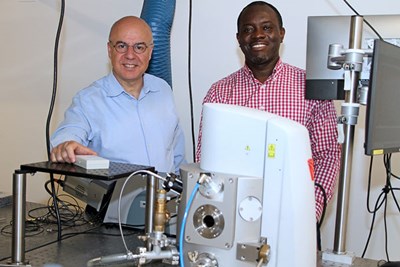Visiting Scientists Bring Expertise and Different Cultural Perspectives
 Image by Foozieh Mirderikvand
Image by Foozieh Mirderikvand
11/10/2022
By Brooke Coupal
After nearly a full day of traveling, consisting of a four-hour bus ride and more than 12 hours of flying, João Luís Garcia Rosa was eager to get to UMass Lowell.
Foozieh Mirderikvand, Kennedy College of Sciences (KCS) coordinator of undergraduate programs, and Fred Martin, KCS associate dean for teaching, learning and undergraduate studies, greeted Rosa at Logan International Airport in Boston before taking him to his new home for the next 10 months.
Rosa, an associate professor in computer science at the University of São Paulo (USP) in São Carlos, Brazil, joined the newly launched Richard A. Miner School of Computer & Information Sciences as a Fulbright Scholar-in-Residence.
The KCS Dean’s Office applied to host Rosa at the university because of the many benefits that come with having an international scholar on campus.
 Image by Foozieh Mirderikvand
Image by Foozieh Mirderikvand
“João brings his scientific expertise to the Miner School, and also a different cultural perspective that can help provide a greater worldview to our educational and research programs,” says KCS Dean Noureddine Melikechi.
“One of the goals of KCS is to internationalize, the college and this visit will contribute to this effort,” Mirderikvand adds.
Rosa is teaching two courses that he created at USP while at UMass Lowell – one in the fall on artificial intelligence and another in the spring on brain-computer interfaces.
“I was hoping that someday I would have the experience of teaching the courses abroad in an English-speaking country like the United States,” he says. “I am grateful to have the opportunity to do that here at UMass Lowell.”
Rosa is also collaborating with Computer Science Asst. Prof. Reza Ahmadzadeh on a research study funded by a $1.5 million grant from the Army Research Laboratory. The research looks at how trust evolves between humans and robots during search and rescue missions.
 Image by Brooke Coupal
Image by Brooke Coupal
During Rosa’s stay at UMass Lowell, he is set to host seminars on how science is taught and conducted in Brazil, giving students and faculty a broader global perspective.
“Science is not local, it’s global,” Melikechi says. “So, the more scientific connections we have, the better.”
Rosa’s visit also expands the relationship between UML and USP, which first blossomed in 2004 as Computer Science Assoc. Prof. Haim Levkowitz completed a Fulbright Scholar program there. He returned to USP for a second time in 2012 under the same program.
“Building relationships with scholars, with scientists and with faculty members throughout the world is good because it’s a cross-fertilization between different systems, different approaches and different standards,” Levkowitz says.
Visiting Scholars Also Make UML Their Home
In addition to a Fulbright Scholar-in-Residence, KCS opened its doors to two Fulbright Visiting Scholars and one visiting scholar on sabbatical who sought out UMass Lowell as a place to advance their research.
The last time KCS hosted a Fulbright Visiting Scholar was before the coronavirus pandemic, and Melikechi is happy to have them back.
“It feels great to have people from all over the world come visit us, so we can exchange ideas with them and learn from each other,” says Melikechi, who is hosting visiting scholar Kemal Efe Eseller in his lab for one year.
 Image by Brooke Coupal
Image by Brooke Coupal
Eseller, an associate professor in the Department of Electrical and Electronics Engineering at Atilim University in Ankara, Turkey, is helping develop a new analytical method to monitor the health of cement structures. The method is based on measuring the chemical elemental composition of the concrete at multiple depths, using a hand-held laser system.
“Prof. Melikechi has made tremendous contributions to NASA's work on Mars missions, cancer diagnosis and more generally in atomic, molecular and optical physics,” says Eseller, who has known Melikechi for 10 years. “His input on this research will help in the development of new innovative research ideas and techniques in science.”
Chemistry Prof. Olof Ramstrom is set to welcome a Fulbright Visiting Scholar into his lab at the end of November. Salima Saidi-Besbes, a chemistry professor at the University of Oran in Oran, Algeria, will spend six months at UMass Lowell researching new nanomaterials for antipathogenic and theranostic applications.
Saidi-Besbes says she chose UMass Lowell as her host university for the Fulbright Visiting Scholars program “based on the faculty and laboratory reputation.”
 Image by Brooke Coupal
Image by Brooke Coupal
Over nine months, Sharma is conducting research on the fabrication of solar cells, which are used to convert sunlight into electrical energy. Solar cells are typically made of silicon, but he is exploring using perovskite and iron pyrite, also known as fool’s gold, as alternative materials to create more flexible and cost-effective solar cells.
For Kumar, Sharma brings a fresh perspective into his lab.
“I’ll be learning some new things from him, and he’ll learn some new things from us,” he says.


